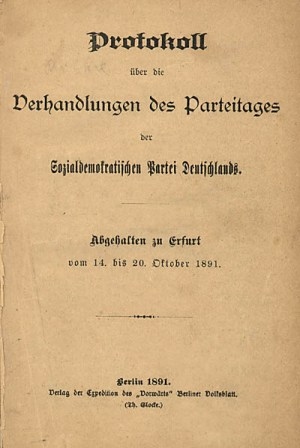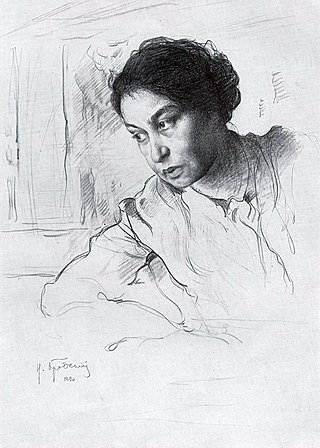
Trotskyism is the political ideology and branch of Marxism developed by Russian revolutionary Leon Trotsky and some other members of the Left Opposition and Fourth International. Trotsky described himself as an orthodox Marxist, a revolutionary Marxist, and a Bolshevik–Leninist as well as a follower of Marx, Engels, Vladimir Lenin, Karl Liebknecht, and Rosa Luxemburg. He supported founding a vanguard party of the proletariat, proletarian internationalism, and a dictatorship of the proletariat based on working-class self-emancipation and council democracy. Trotsky also adhered to scientific socialism and viewed this as a conscious expression of historical processes. Trotskyists are critical of Stalinism as they oppose Joseph Stalin's theory of socialism in one country in favour of Trotsky's theory of permanent revolution. Trotskyists criticize the bureaucracy and anti-democratic current developed in the Soviet Union under Stalin.

The Fourth International (FI) is a revolutionary socialist international organization consisting of followers of Leon Trotsky, also known as Trotskyists, whose declared goal is the overthrowing of global capitalism and the establishment of world socialism via international revolution. The Fourth International was established in France in 1938, as Trotsky and his supporters, having been expelled from the Soviet Union, considered the Communist International as effectively puppets of Stalinism and thus incapable of leading the international working class to political power. Thus, Trotskyists founded their own competing Fourth International.

Amadeo Bordiga was an Italian Marxist theorist, revolutionary socialist, founder of the Communist Party of Italy (PCI), member of the Communist International (Comintern) and later a leading figure of the International Communist Party. Bordiga was originally associated with the PCI, but he was expelled in 1930 after being accused of Trotskyism.

The Communist International (Comintern), also known as the Third International, was an international organization founded in 1919 that advocated world communism, and which was led and controlled by the Communist Party of the Soviet Union. The Comintern resolved at its Second Congress in 1920 to "struggle by all available means, including armed force, for the overthrow of the international bourgeoisie and the creation of an international Soviet republic as a transition stage to the complete abolition of the state". The Comintern was preceded by the dissolution of the Second International in 1916.

The Italian Communist Party was a communist and democratic socialist political party in Italy. It was founded in Livorno as the Communist Party of Italy on 21 January 1921, when it seceded from the Italian Socialist Party (PSI), under the leadership of Amadeo Bordiga, Antonio Gramsci, and Nicola Bombacci. Outlawed during the Italian fascist regime, the party continued to operate underground and played a major role in the Italian resistance movement. The party's peaceful and national road to socialism, or the "Italian Road to Socialism", the realisation of the communist project through democracy, repudiating the use of violence and applying the Constitution of Italy in all its parts, a strategy inagurated under Palmiro Togliatti but that some date back to Gramsci, would become the leitmotiv of the party's history.

The Erfurt Program was adopted by the Social Democratic Party of Germany during the SPD Congress at Erfurt in 1891. Formulated under the political guidance of Eduard Bernstein, August Bebel, and Karl Kautsky, it superseded the earlier Gotha Program.
The International Revolutionary Marxist Centre was an international association of left-socialist parties. The member-parties rejected both mainstream social democracy and the Third International.

Angelica Balabanoff was a Russian-Italian communist and social democratic activist of Jewish origin. She served as secretary of the Comintern from 1919 to 1920, and later became a political party leader in Italy.
In Marxist practice, a minimum programme consists of a series of demands for immediate reforms and, in far fewer and less orthodox cases, also consists of a series of political demands which, taken as a whole, realise key democratic-republican measures enacted by the Paris Commune and thus culminate in the strictly political dictatorship of the proletariat.

Oddino Morgari was an Italian socialist journalist and politician. He was a member of the Chamber of Deputies from 1897 to 1929, for eight legislatures.

Claudio Treves was an Italian politician and journalist.

Critica Sociale is a left-wing Italian newspaper. It is linked to the Italian Socialist Party. Before Benito Mussolini banned opposition newspapers in 1926, Critica Sociale was a prominent supporter of the original Italian Socialist Party (PSI), which included a spectrum of views from socialism to Marxism.
Union of Socialists-Revolutionaries Maximalists was a political party in the Russian Empire, a radical wing expelled from the Socialist-Revolutionary Party in 1906.
The Transitional Program, originally titled The Death Agony of Capitalism and the Tasks of the Fourth International and later reprinted under the title, The Transitional Program and the Struggle for Socialism, is a political platform adopted by the 1938 founding congress of the Fourth International, the international Leninist organization founded by Leon Trotsky. It is an example of a transitional programme.
In Marxist theory, a transitional demand either is a partial realisation of a maximum demand after revolution or an agitational demand made by a socialist organisation with the aim of linking the current situation to progress towards their goal of a socialist society.
Revolutionary socialism is a political philosophy, doctrine, and tradition within socialism that stresses the idea that a social revolution is necessary to bring about structural changes in society. More specifically, it is the view that revolution is a necessary precondition for transitioning from a capitalist to a socialist mode of production. Revolution is not necessarily defined as a violent insurrection; it is defined as a seizure of political power by mass movements of the working class so that the state is directly controlled or abolished by the working class as opposed to the capitalist class and its interests.

The political slogan "Workers of the world, unite!" is one of the rallying cries from The Communist Manifesto (1848) by Karl Marx and Friedrich Engels. A variation of this phrase is also inscribed on Marx's tombstone. The essence of the slogan is that members of the working classes throughout the world should cooperate to defeat capitalism and achieve victory in the class conflict.

The Maximalist Italian Socialist Party or PSIm, was the residual part of the Italian Socialist Party in exile following the split that occurred during the first phases of the Socialist Convention of Grenoble, held on 16 March 1930, by Pietro Nenni and the fusionist fraction.

The XVII Congress of the Italian Socialist Party (PSI) was held at the Carlo Goldoni Theatre in Livorno from 15 to 21 January 1921. After tumultuous proceedings the congress resulted in a split in the party. The communist faction, faced with the refusal of the majority to accept the Comintern line and expel reformists and gradualists, abandoned the PSI and established a new Italian Communist Party.

The I Congress of the Communist Party of Italy was held in Livorno on 21 January 1921, following the split of the communist fraction at the end of the XVII Congress of the Italian Socialist Party (PSI).













